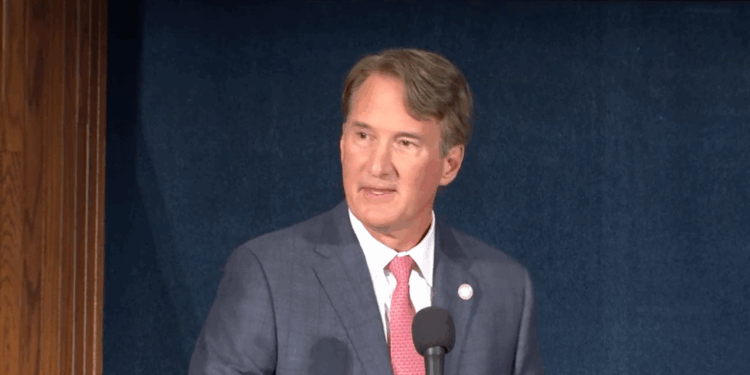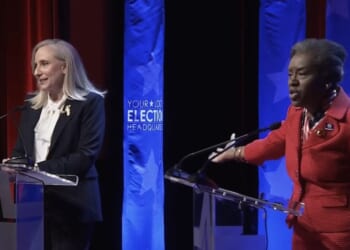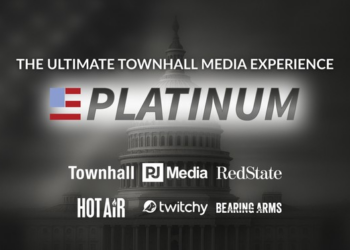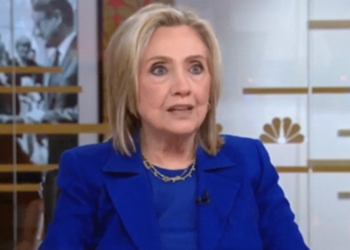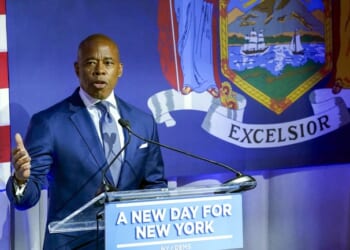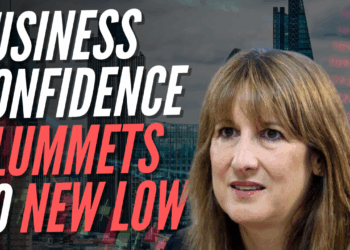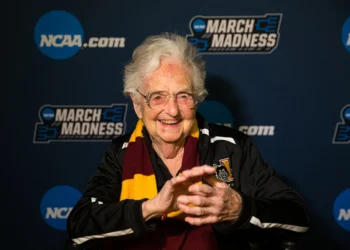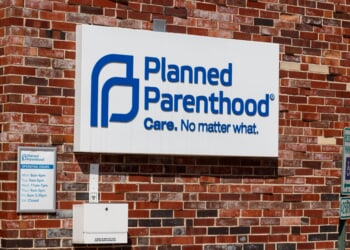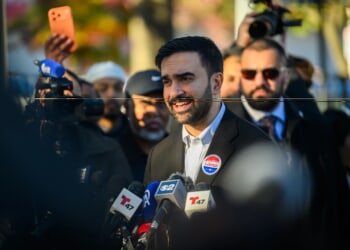Things could have been quite different had former Virginia Governor Terry McAuliffe not uttered these damning words during his gubernatorial debate with now Governor Glenn Youngkin: “I don’t think parents should be telling schools what they should teach.”
Those words came on Sept. 28, 2021, with just weeks to go before the election. The arrogant words flipped all momentum in Youngkin’s favor at a time when many were frustrated with the public school system, and when Youngkin, with his usual earnestness and affable persona, was promising reform. Most public schools in the state had recently been shuttered for an entire year due to COVID, and parents had been made aware through Zoom classes of the poor quality of the education their children were receiving, as well as the extent to which it was ideologically infected. Youngkin, in describing the grim situation at The American Spectator’s annual gala last week, said, “We saw parents pushed out of their children’s lives and told that a quality education was a 12-inch screen.” (RELATED: Linda McMahon Body-Slams Woke Classrooms)
Though schools were back open when McAuliffe made these comments, most public schools were still requiring children to wear masks at all times. (This is despite the fact that scientific research has never demonstrated that masking children during COVID led to better health outcomes for children or adults.) One can only imagine the deleterious impacts of being forced to mask on young children, especially since their ability to learn how to speak and socialize is dependent upon their ability to see others’ faces. (RELATED: Never Forget What They Did to Us Five Years Ago)
Glenn Youngkin promised to improve student learning, remove ideology from the classrooms, move schools toward post-pandemic normalcy, and give parents back the power to direct their children’s education. McAuliffe’s words clarified for many just how much Youngkin’s reforms were needed, and so, by a margin of less than 100,000 votes, Youngkin was elected governor of Virginia.
Youngkin acted quickly against the Democrats’ ongoing harm to the school system. On the day of his inauguration, Jan. 15, 2022, he signed an executive order banning the teaching of “inherently divisive concepts,” including critical race theory.
While it had been impactful when Idaho, Texas, and Oklahoma banned critical race theory in 2021, its banning in Virginia carried much greater weight. This was a state that had just flipped from blue to red. And, moreover, the banning of critical race theory had been the new governor’s very first action. It signaled that the indoctrination of children with critical race theory was encountering serious resistance. The movement to end such teaching, it seemed, was politically popular and gaining ground even in purple states.
Now, four years later, we see the impact of Youngkin’s bravery in forbidding critical race theory, as the ideology is now on the defensive and facing broad repudiation. With the election of Donald Trump, critical race theory faced its biggest defeat. Trump issued an executive order commanding schools to stop teaching critical race theory and vowed to enforce it using civil rights law. “Imprinting anti-American, subversive, harmful, and false ideologies on our Nation’s children not only violates longstanding anti-discrimination civil rights law in many cases, but usurps basic parental authority,” said the order.
Virginia, he said, was leading the nation in learning loss after the pandemic, and yet, under his leadership, student outcomes improved significantly.
Also on his first day as governor, Youngkin, by executive order, removed the state’s mask mandate for public schools and blocked school districts from requiring children to wear masks. Liberal school districts responded with outrage and insubordination. A group of entitled parents sued to “protect” their spoiled children. The ACLU claimed in a lawsuit that not requiring all children to cover their faces with cloth violated the Americans with Disabilities Act.
Youngkin’s fight against the mask mandate, and steadfastness in the face of numerous lawsuits, helped trigger a movement away from the foolish and harmful masking that had already been hurting children for years. By mid-March of 2022, most liberal states had followed Youngkin’s example, in spite of teachers’ unions, who still claimed they would face grave danger if required to teach sans masks.
Youngkin also stood against transgender ideology, implementing new guidelines during his first year in office requiring children to use the biologically correct bathroom. At the time, the Washington Post labeled this as the “latest attempt to restrict rights of transgender students.” But now, this policy is winning when it comes to public opinion — and the law. The Trump administration is actively working against schools that are still allowing children to use the bathroom of the opposite biological sex. For example, in August, the Department of Education threatened to pull funding from the Denver public school district for allowing students to use bathrooms inconsistent with their sex, citing violations of civil rights law.
Youngkin’s defense of sanity in the classroom is the crowning achievement of his time in office. Beyond removing ideological lunacy and steering schools away from Democratic excesses, he also left Virginia’s students better off when it came to learning.
This is something Youngkin noted in his remarks last week at The American Spectator’s annual gala upon his reception of the Good Governance Award. Virginia, he said, was leading the nation in learning loss after the pandemic, and yet, under his leadership, student outcomes improved significantly. “We’ve raised our standards to lead the nation in what it means to deliver an excellent education,” he said. “And one basic truth is that the soft bigotry of low expectations is real. And when you raise them, students perform. How about this for a basic truth: We’ve made the tests harder on our last standard tests, and the students did better.”
In his remarks, Youngkin also noted his success in helping Virginia’s economic growth. He did not present this as growth for its own sake. Rather, he explained how economic vitality strengthens American families. “There’s a basic good message that growth is a good thing, but you have to manage it,” he said. “And in Virginia, we have seen all kinds of growth: economic growth, job growth, opportunity growth, and, yes, people growth.”
Four years of surpluses allowed Youngkin to give taxpayers direct monetary payments. He also eliminated Virginia’s regressive grocery tax and saved taxpayers more than $1 billion by eliminating regulations. The state added 263,700 jobs under him, and reversed its trend of outmigration. He worked vigorously, he noted, to reach the $135 billion in capital commitments in Virginia that were achieved under his governorship. Virginia’s gross domestic product grew by 8.1 percent from 2021-2025. Youngkin also stopped Virginia from having to comply with California’s electric vehicle mandate, though this mandate has since been nullified by Trump.
Youngkin said in his speech at The American Spectator’s gala that one of the most important things he did in office was to stop the Democrats from legislating a host of terrible things. “Sometimes the mark of good leadership is what you stop as opposed to what you get done,” he said. “And over the course of my four years, I’ve had to exercise my veto pen extensively: 400 vetos.”
Democrats maintained control of the Virginia Congress during the entirety of his time in office. That failure to win back Virginia’s statehouse in 2023 for Republicans is a black mark on Youngkin’s record. It resulted in Youngkin being blocked from passing a law limiting abortions, which he had wished to do. Also, a mark against his record is the fact that the poor polling of his lieutenant governor, Winsome Earle-Sears, in the gubernatorial race suggests Democrats will win back the governor’s mansion next year. (Virginia prevents governors from serving consecutive terms.) (RELATED: Virginia’s Early Vote Favors Winsome Earle-Sears)
Terry McAuliffe’s words were a wake-up call for parents, and Glenn Youngkin turned that discontent into lasting policy and national impact.
Yet a Democratic resurgence cannot extinguish Youngkin’s lasting influence on education. Parental rights have been reinvigorated across the nation because of him. Likewise, transgender ideology and critical race theory have been put on defense in schools throughout the country. Terry McAuliffe’s words were a wake-up call for parents, and Glenn Youngkin turned that discontent into lasting policy and national impact.
Without Glenn Youngkin, America’s schools might look very different. Without his election — a clear repudiation of Democrats’ education policies — critical race theory and transgender ideology may still be on the advance, and mutating into stranger and stranger forms of insanity.
Yet, thanks to Glenn Youngkin, Democrats and teachers are ashamed to even say the words “critical race theory,” let alone treat little boys like girls.
The American Spectator’s editor-in-chief, R. Emmett Tyrrell Jr., said upon introducing Youngkin, “They say Virginia is the home to presidents, and quite possibly here is one of them seated here today.”
Glenn Youngkin has not said whether he will seek a Virginia Senate seat in 2026, seek the presidency in 2028, or bide his time for the 2029 Virginia gubernatorial election, but he has left open the possibility for all three. But if he seeks any of them, his record on education will serve as the foundation of his campaign.
READ MORE from Ellie Gardey Holmes:
Whitmer Says America Is Ready for a Female President
Oberlin Students Revive Criminal Anti-Israel Protests, Police Respond

